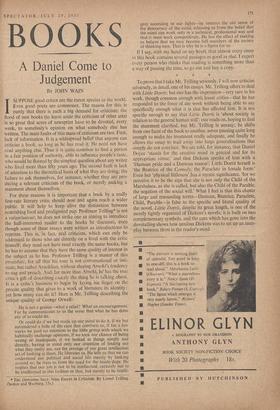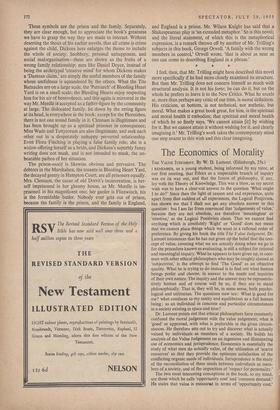176 explanation of why Lord Grey never met Woodrow Wilson
in Washington, and it is interesting to find for the first time a descrip- tion of how Roosevelt hit upon 'quarantine' as the right word for
the policy he vainly advocated in 1937. MAX BELOFF
New Novels
LIVING IN THE PRESENT. By John Wain. (Seeker and Warburg, 12s. 6c1.)
ZERO EIGHT FIFTEEN (THE STRANGE MUTINY OF GUNNER ASCH).
By Hans Hellmut Kirst. (Weidenfeld and Nicolson, 12s. 6d.) IF Living in the Present were John Wain's first novel, one would most likely greet it with critical whoops. For Mr. Wain is that rare bird, an individual, and like it or not, that scratchy voice, that disgruntled view of the universe, that vitality even at the lowest level of splenetic gloom, have power. In the awful similarity of voices and styles and outlooks in current fiction, he sticks his neck Outlike an injured but still exuberant gargoyle, making rude faces with considerable style at the passers-by: His two constant qual- ities are bad temper and artistic integrity, both uncomfortable things to have around, and if he can outgrow the first without losing the second, if, too, he can avoid the potholes of chirpiness, facetiousness, swollenheadedness and the rest that lie in wait for every enfant terrible, without losing the punch and fieriness that are at present his, one fairly boggles at his future possibilities.
Living in the Present must be called a set-back, simply because it is not An advance. The convention that demands a second novel fast on the heels of a first may result, as it has in this case, in plain repetition; so that all that was fresh, because new, in Hurry on Down, seems trite because said again in exactly the same idiom. It is written, not unnaturally, with more assurance than the first, and, though rather too long drawn out, is to my mind a:good deal funnier, because Mr. Wain has gone picaresquing in circles he understands and not slumming in mysterious social pockets he doesn't; as he did now and then in Hurry on Down. But he has done that dangerous thing, thought up an idea and strung a story round it, and though it isn't at all a bad idea, it is, as generally happens in these cases, far too selfconsciously dealt with. 'The moment he decided to commit suicide,' it starts, 'Edgar began to live in the present'; and to illustrate this Edgar, the same gauche, ,racked, neurotic, unloved but not unlovable oaf as his predecessor Charles, shambles his way through a series of rather unadventurous adventures (this time in a whirl round Switzer- land), in which the sort of thing that keeps happening, Edgar's reactions and solutions, the odd characters, shrewdly observed but rather poked in for local colour, the friends, the girls, the social setting, in fact the whole bag of tricks, all take one back to Hurry on Down. And, of course, Mr. Wain is handicapped by the wholq battery of beguiling innocents that have appeared as heroes since he first thought of using one; and by his own inventiveness, that makes him elaborate a good joke to death; and by his own disgust at so much that goes on around him, that tends to show even the physical world misted over with exasperation. But if he has carried over so much that he should have left behind, he also brings along the tautness, vigour, and raciness, the comic gift strung somewhere between neatness and savagery, that all distinguish his writing, fictional or otherwise. Living in the Present is no masterpiece, but it is competent limbering up for the future.
The week's other novel is another essay in the savage-satirical, this time from Germany, but as teutonic humour is beyond-me, like relativity or the music of the spheres, I have to nose round it as warily as if I were poking a ticking time-bomb with an umbrella. The Strange Mutiny of Gunner Aseh is the first volume of a trilogy on German militarism called Zero Eight Fifteen, which has sold, they tell us, half a million copies in Germany since last year; a number that suggests there is something powerfully attractive in the symbolism of, the good little Nazi-hating private who, `worn out by his stand, which he saw was hopeless, accepted his pro- Motion,' went on to be commissioned and decorated, and when the war was over hung his uniform up with joy to be out of it. Above the book's rapid and (in spite of my personal inability to SPECTATOR, JULY 2 9 , 1 9 5 5 laugh at them) not unfunny happenings in and out of the barracks, there hangs that little foggy cloud of moral sanctimoniousness that has made Germany so much feared because so incorrigible; that shifting of responsibility on to anyone but the individual; that incapacity for collective guilt. Asch is a bit of a wide boy, though with grace and charm, who has raised camouflage to a fine art; others can suffer from the military machine, but not he. Once, goaded into a few days' opposition, he revolts, only to be made a corporal through some subterranean politics; and that is the end of the revolution. This misfit worm's-eye view of German military methods is wonderfully interesting because, to my mind, it is almost as wonderfully sinister.
ISABEL QUIGLY
British Sculpture
SCULPTURE IN BRITAIN: THE MIDDLE AGES. By Lawrence Stone. (Pelican History of Art, 45s.) THIS is a very excellent, delightful and useful book. It contains in its 270 pages a very great deal of factual information, much of it not easily accessible elsewhere; the story is enlivened with a great wealth of medimval lore and story; it is well written and easy to read; it is admirably illustrated. Whether the editor of the series was wise to adopt a 'vertical' division, according to subject, rather than a 'horizontal' one, where consideration could have been given to all the arts at particular periods, is, however, to be questioned. At many periods, especially in Saxon and Romanesque times, it is for example almost impossible to consider the sculpture without frequent reference to the paintings, especially the miniatures. Mr. Stone has cause to refer frequently to the sister art, and it would have been helpful to have illustrations of paintings and miniatures available. But apart from this criticism the book could hardly be improved upon.



































 Previous page
Previous page